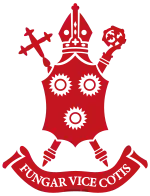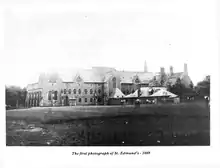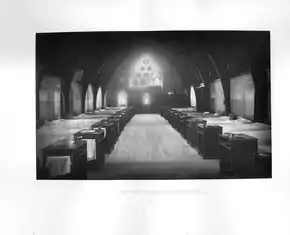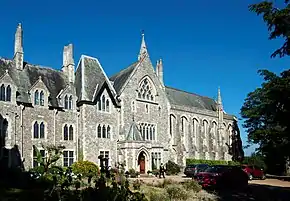St Edmund's School Canterbury
St Edmund's School Canterbury is a private day and boarding school located in Canterbury, Kent, England and established in 1749. The extensive school grounds were acquired in 1855. The school currently caters for girls and boys aged 3–18, including the Choristers of Canterbury Cathedral.
| St Edmund's School Canterbury | |
|---|---|
 | |
| Address | |
St Thomas' Hill , , CT2 8HU | |
| Coordinates | 51°17′30″N 1°03′35″E |
| Information | |
| Type | Public school Private day and boarding school |
| Motto | Latin: "Fungar Vice Cotis" (Be as a whetstone for others to be sharpened upon) |
| Religious affiliation(s) | Church of England |
| Established | 1749 |
| Local authority | Kent |
| Department for Education URN | 118998 Tables |
| Chairman of Governors | Air Marshal C.M. Nickols, CB, CBE, MA, FRAeS |
| Head | Edward O’Connor |
| Gender | Coeducational |
| Age | 3 to 18 |
| Enrolment | 570 |
| Colour(s) | Red & Black |
| Former pupils | Old Edmundians |
| Yearbook | "The Chronicle" |
| Website | www |
The school charges full boarders up to £40,272 per annum (2021/2022)[1] and is among the most expensive Headmasters' and Headmistresses' Conference (HMC) schools in the UK.
The School is currently headed by Edward O’Connor (2018 – Present)
History
St Edmund's School Canterbury was first established in 1749, as the Clergy Orphan Society (later the Clergy Orphan Corporation) in Yorkshire. In 1812, the school moved to St John's Wood at the nursery end of Lord's Cricket Ground. An associated school for girls was located on the same site, but later moved to become St Margaret's School, Bushey, in Hertfordshire.

In 1855, the school moved to Canterbury. The acquisition of property and financing to build the school was provided by Samuel Wilson Warneford. The main school building was designed by Philip Charles Hardwick, architect of Charterhouse School and Adare Manor. The chapel wing of the school was completed in 1858 and remains in daily use.
The choristers of Canterbury Cathedral began their education at the school in 1972. Grant house was established from the former Big School. After 20 years the school reverted to the traditional 4-house system.[2]
In 1982, girls were admitted to the school for the first time.[3]
In 2016 the school was fined £18,000 and ordered to pay costs of £9,670, after a seven-year-old child nearly drowned at the Summerfest event held at the school. The school did not ensure the lifeguards held the relevant qualifications and it could not be sure the guards had any experience or competency.[4]
The Archbishop of Canterbury is the school’s patron.

Facilities

The main building houses classrooms, boarding facilities, dining hall, library and administration offices. Further buildings provide teaching areas for Art, Design Technology and Science. The Francis Musgrave Performing Arts Centre comprises a purpose-built music school with recording studio, practice rooms and recital hall. There is also a 450-seat theatre for concerts and drama productions.
Sports facilities include a sports hall, gym, all-weather astro pitch, golf course, playing fields, 8 tennis courts, a shooting range and a swimming pool. Additional boarding houses are set in the grounds of the school.
The Junior School and Pre-Prep School are located on the same site in their own buildings.

Houses
The Senior School is divided into four day houses:
| Name | Named After |
|---|---|
| Baker | Baker. A Victorian benefactor of the school |
| Wagner | Wagner. A Victorian benefactor of the school |
| Warneford | Dr. Samuel Warneford. A Victorian benefactor of the school, who donated the site and the building of the current location in Canterbury. |
| Watson | Watson. A Victorian benefactor of the school |
In Junior School there are four houses:
| Name | Named After |
|---|---|
| Becket | Thomas Becket |
| Chaucer | Geoffrey Chaucer |
| Marlowe | Christopher Marlowe |
| Roper | William Roper |
The boarding houses:
| Name | Named After |
|---|---|
| Owen (Senior School) | Owen. A benefactor of the school |
| School House (Junior School) | N/A |
Cathedral choir
In 1972, the previously independent Canterbury Cathedral Choir School, which educated the choristers of Canterbury Cathedral, joined the Junior School as the Choir House. Choir House remains at a detached location beside the cathedral, and provided transport conveys the choirboys between the two sites.
Heads
- The name of the first Headmaster, between the years 1751 and 1762, is unknown.
- The Revd Daniel Addison (1762–1783)
- The Revd Daniel Addison (1783–1804)
- The Revd Thomas Cripps (1804–1805)
- The Revd Evan Jones (1805–1813)
- The Revd William Farley (1813–1816)
- The Revd Thomas Wharton (1817–1837)
- The Revd George Bewsher (1837–1841)
- The Revd. Daniel Butler (1841–1867)
- The Revd Charles Matheson (1867–1891)
- The Revd Arthur W. Upcott (1891–1902)
- The Revd Edward J.W. Houghton (1902–1908)
- The Revd Walter F. Burnside (1908–1932)
- The Revd Henry Balmforth (1932–1941)
- The Revd Frederick F.S. Williams (1942–1945)
- William M. Thoseby (1945–1959)
- Walter Stephen Jones (1 term 1959)
- B. Michael S.Hoban (1960–1964)
- Francis R. Rawes (1964–1978)
- John V. Tyson (1978–1994)
- A. Nicholas Ridley (1994–2005)
- Jeremy M. Gladwin (2005–2011)
- Louise J. Moelwyn-Hughes (2011–2018)
- Edward O'Connor (2018 – )
Reviews
The Good Schools Guide note that after the schools' rebranding it was no longer marketing itself as a music and drama school, nor did it continue to describe itself as "non-selective".[5]
The Independent Schools Inspectorate reported in 2015 that the school met all the requirements of the Education (Independent School Standards) Regulations.[6]
Notable former pupils
- Willoughby Allen, Priest
- Jon Baddeley, Auctioneer
- Orlando Bloom, Actor
- Dan Caplen, Musician
- Maggie Cheung, Hong Kong & International Actress
- Thomas Crick, Anglican priest
- Lawrence Durrell, Novelist
- Benjamin Handley Geary VC, Victoria Cross Recipient
- Hope Gill, Anglican bishop
- Michael Goodliffe, Actor
- Sanjeev Gupta, Industrialist
- Darren Henley, Chief Executive of Arts Council England
- Bernard Howlett, Soldier
- Geoffrey Iliff, Anglican bishop
- Robin Jackman, Cricketer
- Ben Kemp, Cricketer
- Kenneth Hagar Kemp, soldier, cricketer, lawyer, etc
- Freddy Kempf, Pianist
- John Long, Priest
- Arthur Lovekin, Journalist and politician
- Nigel MacArthur, Broadcaster
- Percy MacKenzie, Cricketer and airman
- Sir Gordon MacMillan, British Army General
- Chris Nickols, Air Marshal
- Alan Payne, Cricketer
- John Peacey, Cricketer
- David Pettit, Cricketer
- John Pinsent, Classicist
- Adar Poonawalla, CEO Serum Institute of India
- Roger Royle, Priest and broadcaster
- Adrian Snell, Musician and composer[7]
- Hedley Sparks, Anglican priest and academic
- Max Spiers, Conspiracy theorist [8]
- Mark Strudwick, British Army officer who served as General Officer Commanding Scotland
- Stuart Townend, Athlete, soldier and schoolmaster
- Arthur Alban Wright, British colonial administrator
References
- "Fees". St Edmund's School. Retrieved 10 June 2022.
- "History – St Edmund's School Canterbury". www.stedmunds.org.uk. Retrieved 23 February 2018.
- Foundation on a Hill by Jock Asbury-Bailey.
- "Boy, 7, nearly drowns at school event". 14 September 2016.
- "Good Schools Guide".
- "2015 ISI Inspection report".
- CROSSrhythms (accessed: 6 July 2023)
- Daily Mail (23-Oct-2016)